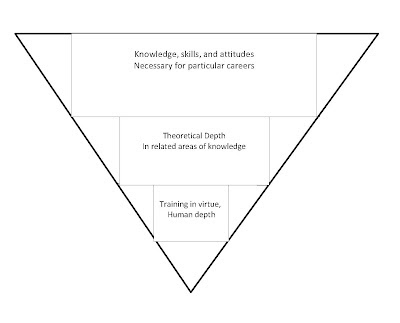When we went about designing a seminary, we started with the knowledge, skills, and dispositions we believed a pastor should have and worked backward to the curriculum. This is not the traditional way of doing education. The traditional way is to have a set of standard courses that correspond to classical subjects that have been around in some form or another since ancient times. You start with the trivium of grammar, logic, and rhetoric. Then you add the quadrivium of arithmetic, geometry, music, and astronomy.
The traditional university potentially faces the same crisis that seminaries have. They are perceived to be irrelevant to what a person actually needs to know with a price tag that can infuriate. Universities do have a major advantage that seminaries don't. Eighteen year olds don't go to college just to get educated. Honestly, it's much more about the social life.
If we were to design a college or university from scratch these days, we would ideally start with what students actually need to know, be able to do, and what attitudes they need to have to do them. Then we would work backward to a curriculum to get them there.
Mind you, the best universities have been back filling their curricula for years. And very targeted disciplines have been required to do these sorts of things to meet state standards and such. If you are studying nursing or education, your field is well sorted.
There is the additional problem that a lot of students don't know what they want to do. It is perhaps only natural that colleges tend to start with the bottom part of the triangle above, liberal arts, then go to the top part to train specific skills, while slipping in some theoretical depth for those who want it--or you can get that in graduate school.
Ideally, though, you would know the specific career you wanted to go into from the start and you would first learn the very concrete skills you need to be able to do it well. Then you would add theoretical depth to understand the "inners" of why you do things that way. Finally, you would study what it means to be a virtuous and full human, especially in the context of the life you plan to lead. At a Christian university, this is the place where faith especially comes into play.
What distinguishes a university from a technical school more than anything else is the bottom part of the triangle. Without a sense of history, of culture, of art, of virtue, of the place of science in the world we live, we cannot intelligently participate in the governing of society. The problem is that these areas are often not taught in ways that make their relevance clear, nor are they usually taught in relation to a person's trajectory in life.
If I were founding a university, I'd try to do what we tried to do with the seminary. Focus especially on the skills and knowledge necessary to do the job, while adding as much theoretical depth as possible while still remaining affordable. And in the university setting, you would add the element of "training to be human," the liberal arts, but taught in a way that makes their relevance to life clear.
Wednesday, June 27, 2012
Subscribe to:
Post Comments (Atom)





2 comments:
Do it. You should found a university. ;)
Did you know that there are some people who go around buying failing colleges and flip them? They figure the accreditation alone is worth 10 million and 10 years. When they flip them, they make them for profit and sell stock... and usually make a ton in the process.
But I am a slave in a world of such Titans.
Post a Comment